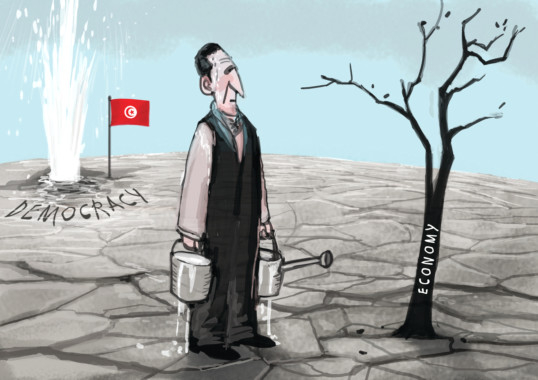
Tunisia has debunked the widely-held view that the Arab world is not fit for democracy. The country’s latest parliamentary elections, hailing in a new five-year term parliament, proves that democracy is alive, well and kicking. This is despite the fact the democratic trappings have only been in existence since 2011 when dictator Zine Al Abidine Bin Ali was removed from power.
What was interesting about this election was that all political parties accepted the results gracefully and congratulated Tunisia as though it was not a country with a four-year-old democratic government but one that has been a democracy since time immemorial. It is now posing as a model for Arab politics, which are beset by chaos, violence and political assassinations in countries like Libya, Egypt, Syria and Yemen, where the Arab Spring was born.
While the Islamist Al Nahda party was expected to win, since it was the majority in the last parliament, getting 89 seats in the elections in the Constituent Assembly in 2011, it lost no sleep about coming second at around 69 seats. Its leader Rashid Gannoushi was head over heels on election night, congratulating the director-general of the Nida Tunis, Beji Saeed Al Sebsi, whose party won the elections with a smashing 85 seats in the 217-seat parliament. That is a prime example of stability and acceptance of the other, something that has neither been seen before nor expected in the Arab world.
There was razzmatazz about the election this time in the country, which was the first to erupt with protests during the Arab Spring. Tunisia has long espoused secularism. Indeed, once the tentative results were out, the moderate Islamists had a big party inside and outside their offices, as if this was the normal practice and state of affairs, which is generally only expected in countries that have centuries-old democratic traditions. They celebrated the election results as a “democratic event” and a handshake for the whole of Tunisia, in an election were there was a slightly more than 60 per cent turn-out and one in which over 1,300 candidates contested.
Tunis now begins yet another new political era based on a liberal constitution that was put into effect earlier this year, which speaks volumes about free speech, the rule of law and parliamentary practice. Al Sebsi, an old-guard politician belonging to the previous dictatorial eras which the country went through, and his newly established Nida Tunis party, will quickly set about forming a coalition government of different parties, including Islamists as well as leftists, socialists and labour supporters.
This could be easier to do than what many may think for after all, the Nida Tunis is a broad-based organisation. Yes, it includes other politicians from the old era of totalitarianism, but it also represents many other sectors such as trade unionists, professionals and others. The 87-year-old Al Sebsi, who describes his party simply as a modern one, has now a golden opportunity to set Tunisia on a right blossoming track of development by bringing everyone on board, secular organisations and intellectuals, businessmen and hard-hitting politicians by including names such as the Congress Party, (known by its French acronym UPL), Popular Front, Democratic Current and Afek Tunis, which are seen as minority parties but are full of imaginative ideas and programmes.
It is inevitable that the coming period will be one of political horse-trading, full of fluidity among the country’s political elites — an era that is to be extenuated by the presidential elections that will take place on November 23. And where more political punch-lines will be created.
But it is wrong to say this will lengthen a period of political instability. It will be a period based on democratic change, agreements, accords and constructive dialogue. With little time to lose, Al Sebsi will likely move fast, now that the parliamentary elections are out of the way and will likely go straight ahead and improve the local economy and the high unemployment at 15 per cent nationally and 40 per cent among youths in particular. These are the problems that basically sparked the Arab Spring in that country in late 2010 and early 2011.
Tunisians themselves argue that the lack of improvement in their economic situation was one of the important reasons why they did not vote again for Al Nahda and because of the foot-dragging by their politicians. But Al Nahda continued to do well in spite of their shrinking support. In all fairness, and this is what is being said among the Islamists, they inherited a bad economic situation. To be able to put that right in a country that went through a revolution and a period of instability will simply take time.
This view was confirmed by caretaker Prime Minister Mehdi Jomaa when he took over early this year, after allegations that Al Nahda politicians were involved in terror activities. He is on record as saying that the economy needed another three years to recover. However, democratic practice, parliamentary elections and voter preferences neither understand nor forgive politicians who cannot put things right straight away. So the electorate voted against Al Nahda. But that does not mean that the prime minister-elect has a magic wand and will put things right at once, although he criticised the Islamists for not doing and blamed their political inexperience for it.
It is still early days. Being in power is not like being outside it. The Tunisian electorate still expects to see a magic wand. If nothing happens, they can indeed go back to the ballot box, which is still a novel experiment for a country that has been living under dictatorial rule at least since the mid-1950s.
Marwan Asmar is a commentator based in Amman. He has long worked in journalism and has a Phd in Political Science from Leeds University in the United Kingdom.










